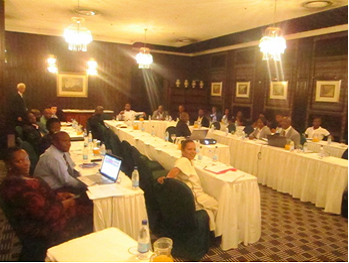This was one of the key messages delivered by Mr. Zvikomborero Manyangadze on behalf of the Director of Water Resources in the Ministry of Environment, Water and Climate at the UN Water Consultation workshop held in Harare on 28 March 2014. He further emphasized the need to align the water agenda in Zimbabwe to the Zimbabwe Agenda for Sustainable Socio-Economic Transformation (Zim Asset) a national economic blueprint whose main objectives are also centered on poverty eradication and food security among others. The meeting was attended by over 30 senior officials from government departments, water management institutions, universities, cooperating partners and Zimbabwe Water Partnership. The workshop also got guidance from Mr. Alan Hall GWP Senior Adviser and the global consultations coordinator and Ms. Ruth Beukman from GWPSA who were present throughout the workshop.
The workshop which was a result of prior preparations and consultative efforts of ZWP members had stakeholders presenting on the country situation on the 5SDG thematic areas i.e. Water Resources Management, Water Related Disasters, Water Governance, Wastewater, Pollution and Water Quality, and Drinking Water, Sanitation and Hygiene i.e. WASH sector. The workshop also suggested that a sixth thematic area on water financing be added. Generally sanitation and hygiene has deteriorated in most parts of the country as a result of low maintenance. There is a lot of pressure on the existing infrastructure due to low investments, population growth and damage usually from water related disasters whose increase has been attributed to climate change. Water sources have also suffered from industrial and urban effluent which cannot be easily accommodated in the overloaded treatment plants.
If the country is going to record meaningful progress, it will require a lot of investment in both existing and planned water infrastructure (water supply, monitoring and sewage treatment) to ensure the country meets its targets such as zero open defecation (predominantly in rural areas) and access to clean and reliable water to all. There is also need to address human capacity development to all water related sectors. A lot of brain drain was experienced from 2000-2010 due to economic down turn experienced in the country. The country will need to invest in research and development on innovative systems which has also been largely ignored over the years.
The Zimbabwe consultations which culminated into the workshop are part of the broad worldwide UN Water consultation being coordinated by the Global Water Partnership. The agenda seeks to streamline water issues and obtain views from 30 key countries on the post-2015 development agenda for water and sustainable development. The consultations apart from contributing to the global water goal, will also feed into the country consultative process on the overall SDGs, post 2015 which Zimbabwe is yet to undertake. It is critical that Zimbabwe completes the overall consultative process because of its lead role where its core shares a seat with Zambia on the UN Open Working Group
